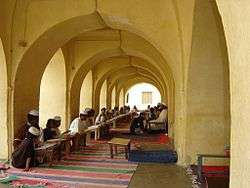Education in Islam
| Part of a series on |
| Islam |
|---|
 |
|
Education in Islam is a concept based on verses of the Quran as well as hadiths that emphasize the positive benefits to be gained from the acquisition of knowledge.
Etymology
In Arabic three terms are used for education. The most common is ta'līm, from the root 'alima, which means knowing, being aware, perceiving and learning. Another term is Tarbiyah from the root of raba, which means spiritual and moral growth based on the will of God. The third term is Ta'dīb from the root aduba which means to be cultured or refined in social behavior.[1]
Ideas
Syed Muhammad Naquib al-Attas described the Islamic purpose of education as a balanced growth of the total personality through training the spirit, intellect, rational self, feelings and bodily senses such that faith is infused into the whole personality.[1]
Seyyed Hossein Nasr stated that, while education does prepare humankind for happiness in this life, "its ultimate goal is the abode of permanence and all education points to the permanent world of eternity".[1]
According to the Nahj al-Balagha, there are two kinds of knowledge: knowledge merely heard and that which is absorbed. The former has no benefit unless it is absorbed. The heard knowledge is gained from the outside and the other is absorbed knowledge means the knowledge that raised from nature and human disposition, referred to the power of innovation of a person.[2]

The Quran is the optimal source of knowledge.[3] For teaching Quranic traditions, the Maktab as elementary school emerged in mosques, private homes, shops, tents, and even outside. [4][1]
The Organization of the Islamic Conference (OIC) has organized five conferences on Islamic education: in Mecca (1977), Islamabad (1980), Dhaka (1981), Jakarta (1982), and Cairo (1987).[5]
See also
Reference
- 1 2 3 4 Staff, Writer. "Islam - History of Islamic Education, Aims and Objectives of Islamic Education". education.stateuniversity.
- ↑ Mutahhari, Murtaza (2011-08-22). Training and Education in Islam. Islamic College for Advanced Studie. p. 5. ISBN 978-1904063445.
- ↑ Fathi, Malkawi; Abdul-Fattah, Hussein (1990). The Education Conference Book: Planning, Implementation Recommendations and Abstracts of Presented Papers. International Institute of Islamic Thought (IIIT). ISBN 978-1565644892.
- ↑ Viv, Edwards; Corson, David (1997). Encyclopedia of Language and Education. Kluwer Academic publication. ISBN 978-1565644892.
- ↑ Staff, Writer. "Education". oxfordislamicstudies.